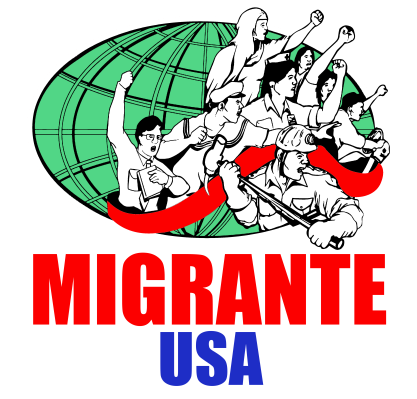TOWARDS A STRONGER MOVEMENT TO END MODERN-DAY SLAVERY
Approximately 300 attended the Breaking the Chains, Determining Our Future: Towards Justice and Ending Modern-Day Slavery anti-trafficking summit last Saturday, May 12. Hosted by the Episcopal Diocese of Los Angeles, the summit took place at the Cathedral Center of St. Paul overlooking Echo Park in LA.
This year’s summit was the fourth organized by the Mission to End Modern Slavery (MEMS) and the first in California. The previous three took place in New York City. The summit was co-organized by IMA, and grassroots organizations Migrante Southern California, and Migrante Northern California.
The summit kicked off with an ecumenical service– “Misa del Migrante” or Mass for Migrants officiated by members of the Episcopal Asiamerica Ministries (EAM) and the United Church of Christ.
An vibrant Korean drumming performance by Korean members of the EAM-LA was followed by the keynote address of Elmer Labog, chair of the Kilusang Mayo Uno (May First Movement) in the Philippines who spoke of examining labor trafficking in the global context of neoliberalism and put forth workers collective struggle and movement as the only way forward against intensifying neoliberal attacks aimed at global labor.
The first panel “Sharing Our Stories, Breaking the Chains” featured first-hand accounts of survivors of labor trafficking who are seeking justice. The panel included Fritzie Corral, trafficked to work in a hotel in North Carolina, Adelaida Legaspi, a public school teacher illegally recruited to teach in Garland, Texas, Noel Abalos, also a teacher trafficked to teach in North Carolina, and Daniel Castellanos, a former H2B visa holder who was recruited to work in construction in New Orleans post-Katrina but instead found himself duped into working as hotel staff.
“You don’t think that these things can happen to you, and I really didn’t think it would happen to me and at the time [I was working] I didn’t know that was human trafficking. I felt it was unfair, but you know, you do everything you can do, especially when you’re working in a different country. I was just looking for work to support my family like anyone else, and then all this happened, you know?” Corral shared.
“Labor trafficking is the most common form of human trafficking in the world, but it is an invisible problem because it is camouflaged by policies such as the federal guest worker program. It is so normalized it is not seen as an oppressive system. Unfortunately, when victims seek help, they can be shamed or even dismissed because the problem is so misunderstood,” states MEMS director Bernadette Ellorin.
Antonio Arizaga, an Ecuadorian immigrant and Vice Chairperson of the International Migrants Alliance (IMA), a global grassroots formation of migrant workers and refugees delivered a presentation on the United Nations agenda on migration also as a neoliberal agenda, citing the need for migrants to organize to challenge its latest global framework agreement– the Global Compact on Migration.
The second panel “Building a Movement, Determining Our Future” featured organizers, workers and advocates active in grassroots movement-building. Panelists included Susan Pineda, legal specialist for Gabriela DC, Steven Osuna of the Human Rights Alliance for Child Refugees and Families, Lester Ramos of Migrante Southern California and Bernadette Herrera of the National Organizing Committee of Migrante USA.
The second panel further elaborated on guest worker trafficking in the US as a growing epidemic as more employers are relying on cheap foreign labor over local workers to ensure paying less wages and to prevent the workers hired from joining unions. The panel also pointed to Donald Trump himself relying on guest workers for his multi-billion dollar hotel business, and challenged the statutory definition and purported legal remedies of labor trafficking per the US State Department, which has oversight over the federal guest worker program in this country, including enforcement of anti-trafficking laws and prosecution of traffickers.
“Real justice for victims of human trafficking cannot be won just in winning cases or attaining T-visas. [We must work to end] the conditions that cause modern slavery. Real justice can only be achieved if we end policies that allow for the exploitation of migrants,” stated Herrera.
The summit then broke into smaller groups for reflections and action proposals. The summit participants agreed to contribute towards building a strong grassroots movement with trafficking survivors, to support the hundreds of trafficked teachers in Garland, Texas, to support the founding assembly of Migrante USA in New York City this September, and to support the 4th International Assembly of IMA in Mexico City this November.
The participants agreed to support the organizing of future summits in the US.
The Igorot dancers of Holy Trinity St. Benedict Church of Alhambra closed the summit a vibrant traditional community dance. Igorot is a collective term for the indigenous tribes of the Northern Philippines.
This year’s summit gathered an extensive list of co-sponsors including the Episcopal Asiamerica Ministries in Los Angeles (EAM-LA), Coalition to Abolish Slavery and Trafficking (CAST), National Guestworkers Alliance, Asia Pacific American Labor Alliance (APALA), National Alliance for Filipino Concerns (NAFCON), Thai Community Development Center, Centro de los Derechos del Migrante, Inc.(CDM), Black Alliance for Just Immigration (BAJI), Filipino Bar Association of Northern California (FBANC), Filipino Migrant Center, Human Rights Alliance for Child Refugees and Families, Arab Resource and Organizing Center (AROC), Filipino Community Center, Santa Clara County Wage Theft Coalition, and the Wayside United Methodist Church.
For more information, visit endmodernslaverynow.org

















all photos credited to Jade Palma Gill
